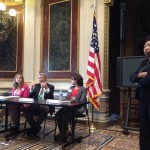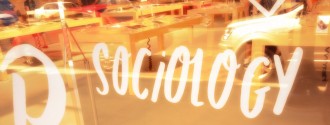
When universities invite me to visit, I often do a second talk for graduate students on “safe and risky research agendas.” Many students around the country seem stuck between the jobs crisis of the recent past and an uncertain future of disruptive technology, tenure battles, and mounting student debt. Maybe it’s not surprising, then, that many of our best and brightest seem to oscillate between a full-on “strategic” concern for maximizing their employability and a full-on utopian disregard for their market prospects. When they ask for advice, I first advise them that not all advice is good advice. But I do suggest they invest a bit more in teaching and that they consciously pursue both a safe and a risky research agenda. Such advice, I hope, will be good for them as individuals and good for the collective sociological enterprise.
By safe agenda, I’m referring to a line of research in which the student builds up specific authority and expertise in an established topic or area. This can arise from long-term interest in a subject or intensive interest stemming from dissertation or research assistant work. Once one has written a paper or two in an area, the start-up costs of publishing an additional piece diminish – it isn’t as though they have to master a completely new field with every article. They are also likely to find an established and active research literature surrounding their safe agenda, with obvious next steps to pursue. This means that it is pretty easy to identify which journals will be interested in a study, the editors can readily identify knowledgeable experts to review it, and the reviews will be relatively consistent and predictable. Pursuing a safe agenda in a series of book or article publications is likely the single best way to establish a reputation as an expert and authority in a field or subfield – and that can lead to jobs and promotions. In short, “safe” in this context represents the foundational work of good social science, rather than, say, boring or easy research.
Risky agendas, in contrast, tend to be messier. The field might be new to the researcher and her advisors, so the start-up costs are higher. There may be few good studies to draw upon, or perhaps a lot of the action on the topic is taking place in other fields or disciplines. This means she will likely need to frame her research in ways that convince people in the field they should be interested in the topic. This isn’t an easy process. When a reviewer told Jason Houle that his research on debt was not sociology, for example, he suggested creating a new journal: The American Journal of Not Sociology. Even when successful in framing the article for sociology, such work tends to elicit polarized reviews and evaluations. Moreover, there is little agreement on the “next logical steps” to be taken and there is no consensus that even the very best work on the topic merits publication or funding. Still, if and when such research is published, the author tends to develop a reputation as a “mover and a shaker” with fresh ideas and energy.
Research time is scarce for social scientists, but I try to reserve at least 10 percent of my research energies for my risky agenda. This includes new ideas with a high probability of immediate failure and/or quixotic ideas that will not pay off for years or even decades. This is because I most admire the sociologists (and artists, for that matter) who somehow manage to sustain a safe and a risky agenda throughout their careers. Over time, they’ve developed well-earned reputations and careers as both productive “finishers” and creative wild-cards. Perhaps fields and disciplines also prosper when they simultaneously create space for safe and risky agendas. As Wayne Coyne once said, “It’s probably a good thing to be considered stable, but with a capacity for madness.” I’d wager that the same holds true for individual sociologists and for sociology as a collective enterprise.





